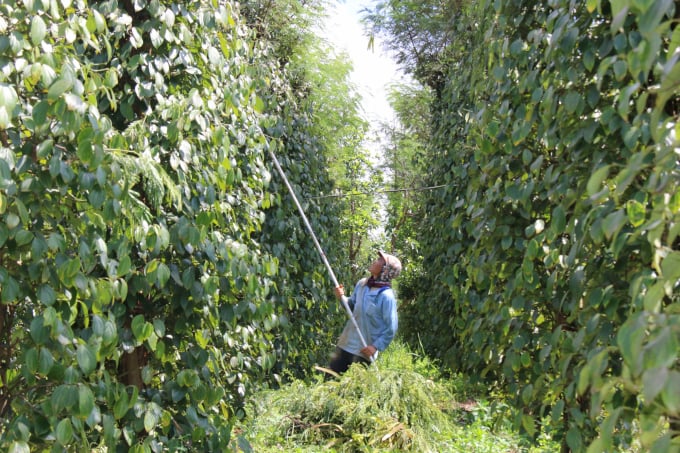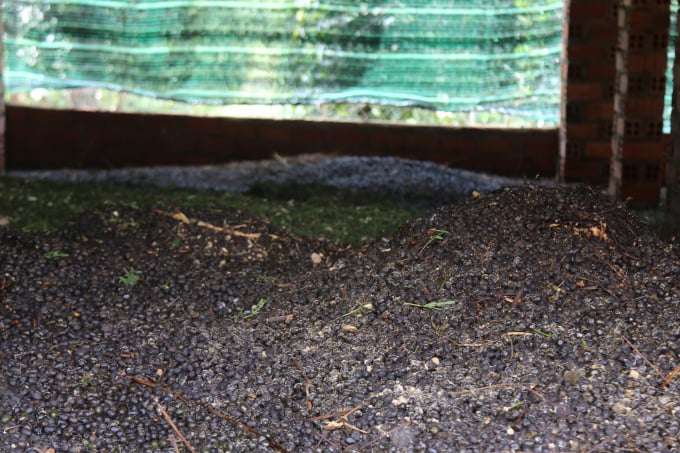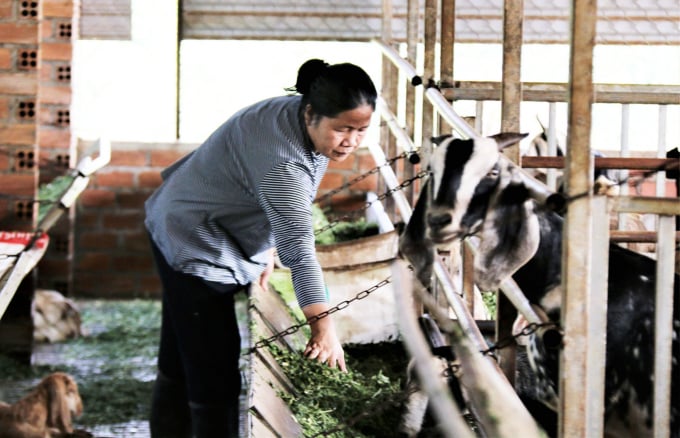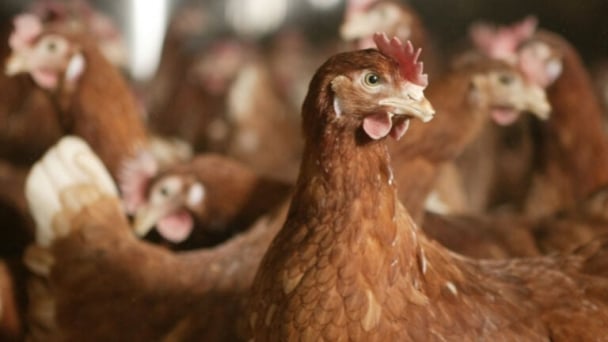June 25, 2025 | 00:06 GMT +7
June 25, 2025 | 00:06 GMT +7
Hotline: 0913.378.918
June 25, 2025 | 00:06 GMT +7
Hotline: 0913.378.918

Organic pepper has a higher selling price than the market price, and environmental-friendly as well. Photo: Quang Yen.
Mrs. Nguyen Thi Le Ha’s Huy Hung Farm, built in 2015, with a pepper acreage of 15 ha, is known as an agricultural development location that meets international standards for good agricultural production (GlobalGAP).
According to Mrs. Ha, when the farm was built, the price of pepper was around VND 200,000/kg, but the family determined to do agriculture in a stable and long-term way, not following the trend.
“Instead of investing in a lot of fertilizers, pesticides, and chemical stimulants to help plants grow and harvest quickly, my family produced pepper ‘following nature’. Specifically, my family uses biological products to take care of pepper instead of using fertilizers and pesticides like other households”, shared Mrs. Ha.
The farm buys seedlings at the seed supply addresses certified by specialized agencies to meet standards. With good varieties, proper care in the direction of organic and biological methods, the pepper gardens rarely get sick, the plants grow well, the yield is about 3 tons/ha.

Goat manure at Mrs. Ha's farm is used to fertilize pepper plants in an organic way. Photo: Quang Yen.
Ms. Ha added that all pepper products of the farm are purchased by Son Ha Huong Spices Co., Ltd at a stable price and always higher than the market level. Specifically, in 2018 and 2019, the pepper price is at VND 40,000 - 50,000/kg, the selling price of Duy Hung Farm is VND 120,000/kg.
At this price, the family earns billions of VND every year. More importantly, the unit's products always overcome technical barriers and spice standards of international spice associations, exportable to many markets such as the United States, Japan, and Southeast Asian countries…
The notable point is that Huy Hung Farm combines husbandry with farming in the form of "circulation". Accordingly, from numerous leaves of acacia and cottonwood trees as pillars to thousands of pepper trees, Mrs. Ha utilizes it as food for about 100 goats.

Mrs. Nguyen Thi Le Ha at the family's goat farm. Photo: Quang Yen.
At present, the farm’s goats provide seeds for households in the area. The goats have been ordered by the people until the end of the year. Every year, the family gives people 180 kids. The money from selling goat seeds and fertilizer from goats every year makes a profit of more than VND 400 million...
Although the profit is high, Mrs. Ha claimed that investing in organic agriculture also proves to many difficulties. According to Ms. Ha, the State has had the policy to encourage farmers to follow the organic farming model. However, farms currently have difficulty in finding output.
“The family wishes to build a processing factory to ensure that the farm's pepper products exported to foreign countries meet the standards. In addition, the farm is also a place for families with organic production to have a place to sell products at a good price", said Ms. Ha.
Nonetheless, in order to do that, she also hopes that the local government can create conditions in policies and build a sustainable raw material area.

(VAN) Research has shown that Hy-Line brown hens may be better suited for cage-free production based on overall greater egg production and other quality metrics.
![Turning wind and rain into action: [9] Digitizing hydrometeorological data in response to climate change](https://t.ex-cdn.com/nongnghiepmoitruong.vn/608w/files/news/2025/06/17/z6704423696987_15fd32ffc26d590d204d520c9dac6786-nongnghiep-165943.jpg)
(VAN) Farmers have begun accessing hydrometeorological applications to adjust their cropping schedules, aiming to ensure productivity and adapt to climate change.
![Turning wind and rain into action: [8] Real-time salinity detection and early warning technology](https://t.ex-cdn.com/nongnghiepmoitruong.vn/608w/files/news/2025/06/17/z6704423696987_15fd32ffc26d590d204d520c9dac6786-nongnghiep-151127.jpg)
(VAN) Thanks to the integration of modern hydrological-hydraulic models, remote sensing technologies, and artificial intelligence, the accuracy of hydrological forecasting has significantly improved.
![Turning wind and rain into action: [7] Early disaster warnings help marine farmers minimize losses](https://t.ex-cdn.com/nongnghiepmoitruong.vn/608w/files/news/2025/06/17/z6704423696987_15fd32ffc26d590d204d520c9dac6786-nongnghiep-142942.jpg)
(VAN) In recent years, thanks to early disaster warnings and forecasting, marine farmers in Khanh Hoa province have been able to reduce risks and losses, thereby improving production efficiency.
![Turning wind and rain into action: [6] ‘Four on-the-spot’ disaster management software](https://t.ex-cdn.com/nongnghiepmoitruong.vn/608w/files/news/2025/06/17/e5a48259d6a262fc3bb3-nongnghiep-183800.jpg)
(VAN) By simply activating the scenario on the disaster management software, the relevant authorities immediately know how many households need to be evacuated, where to evacuate them to, and by what means of transportation…
![Turning wind and rain into action: [5] Hue applies modern technology in disaster forecasting](https://t.ex-cdn.com/nongnghiepmoitruong.vn/608w/files/news/2025/06/17/z6704423696987_15fd32ffc26d590d204d520c9dac6786-nongnghiep-093938.jpg)
(VAN) In Hue city, modern technology has recently been applied in meteorological and hydrological forecasting and warning, helping to reduce the damage caused by natural disasters.

(VAN) A cutting-edge farming technique being implemented on an experimental ranch in Arizona's Sonoran Desert has already saved a billion gallons of water over five years, according to Civil Eats.